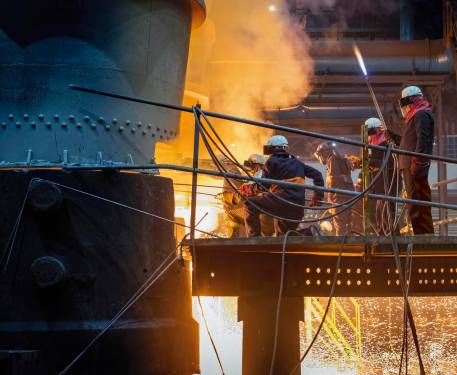Daniel Liss, co-founder of the social network Dispo and the dating app TeaserAI, is convinced he’s onto the next big thing: steelmaking. It all started with a few op-eds he wrote for TechCrunch about antitrust enforcement in social media. The commentaries caught the attention of some people in Washington, D.C., and led to an invitation for Liss to guest judge a war game capstone exercise hosted by the National War College in spring 2023.
The war game simulated a scenario where the U.S. and China fought for supremacy over Taiwan and the South China Sea. Liss’s key takeaway? The U.S. lacks the shipbuilding capacity and the steel needed to support its military infrastructure. This realization sparked his obsession with the steel supply chain and ultimately led to the birth of his latest startup, Nemo Industries.
Nemo Industries sits at the intersection of two major American concerns: steelmaking and AI. While the company has been operating in stealth, Liss shared some details about its vision. At its core, Nemo will use AI to optimize pig iron production, modernizing an industry that Liss describes as outdated. Many plants still rely on Excel spreadsheets or even clipboard technology, despite the deep expertise of the people running them.
But Nemo isn’t just another industrial software company. It plans to build its own furnaces, betting that AI-driven operations from the ground up will give it a 20% to 30% margin advantage over competitors. Steelmaking is a capital-intensive business—Hyundai Motor Group recently announced a $6 billion steel plant in Louisiana—but Nemo’s focus on pig iron, an intermediate product, may reduce costs.
The company will use natural gas to fire its furnaces, a cleaner alternative to coal, which dominates the industry. Liss also mentioned exploring carbon capture, made financially viable by tax incentives under the Inflation Reduction Act.
Liss’s partner in Nemo is Michael DuBose, an investor with experience building LNG infrastructure at Cheniere Energy. Scaling Nemo will require significant investment. The startup has already raised $28.2 million and is in talks for a $100 million Series A. Additionally, two southern states have offered over $1 billion in incentives if Nemo builds three plants within 15 years.
The challenge is immense, but Liss believes ambition is necessary to deliver the returns venture capitalists expect. He points to history, noting that foundational industries like steel have created some of the greatest fortunes—think Rockefeller, Carnegie, and Mellon. In his view, the next wave of outsized returns could come from reinventing these very industries.

